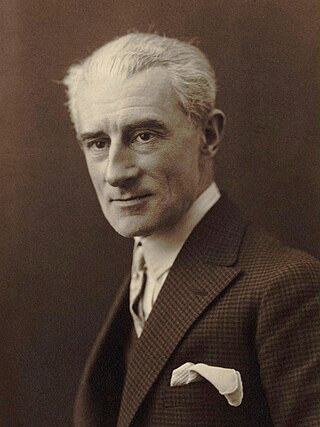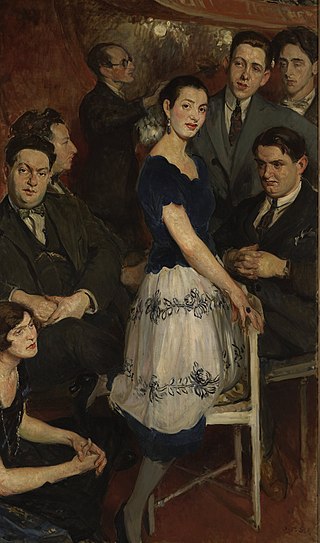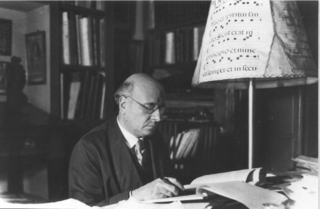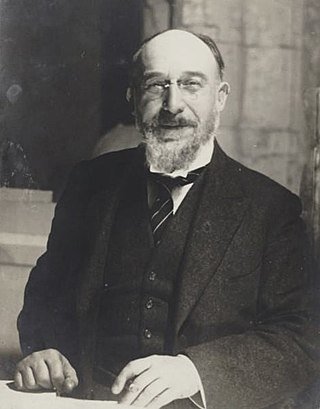
Eric Alfred Leslie Satie, who signed his name Erik Satie after 1884, was a French composer and pianist. He was the son of a French father and a British mother. He studied at the Paris Conservatoire, but was an undistinguished student and obtained no diploma. In the 1880s he worked as a pianist in café-cabaret in Montmartre, Paris, and began composing works, mostly for solo piano, such as his Gymnopédies and Gnossiennes. He also wrote music for a Rosicrucian sect to which he was briefly attached.

Joseph Maurice Ravel was a French composer, pianist and conductor. He is often associated with Impressionism along with his elder contemporary Claude Debussy, although both composers rejected the term. In the 1920s and 1930s Ravel was internationally regarded as France's greatest living composer.

Darius Milhaud was a French composer, conductor, and teacher. He was a member of Les Six—also known as The Group of Six—and one of the most prolific composers of the 20th century. His compositions are influenced by jazz and Brazilian music and make extensive use of polytonality. Milhaud is considered one of the key modernist composers. A renowned teacher, he taught many future jazz and classical composers, including Burt Bacharach, Dave Brubeck, Philip Glass, Steve Reich, Karlheinz Stockhausen and Iannis Xenakis among others.

"Les Six" is a name given to a group of six composers, five of them French and one Swiss, who lived and worked in Montparnasse. The name has its origins in two 1920 articles by critic Henri Collet in Comœdia. Their music is often seen as a neoclassic reaction against both the musical style of Richard Wagner and the Impressionist music of Claude Debussy and Maurice Ravel.

The Conservatoire de Paris, also known as the Paris Conservatory, is a college of music and dance founded in 1795. Officially known as the Conservatoire National Supérieur de Musique et de Danse de Paris (CNSMDP), it is situated in the avenue Jean Jaurès in the 19th arrondissement of Paris, France. The Conservatoire offers instruction in music and dance, drawing on the traditions of the 'French School'.

Marguerite Marie-Charlotte Long was a French pianist, pedagogue, lecturer, and an ambassador of French music.

Michel-Dimitri Calvocoressi was a French-born music critic and musicologist of Greek descent who was a British citizen and resident in England from 1914 onwards. He is especially noted for his writings on Russian classical music, particularly on the life and works of Modest Mussorgsky, and his close association with the French musical establishment.
Michel Decoust is a French composer and conductor.
Éliane Reyes is a Belgian pianist who is known both as a soloist and as a chamber musician. She is also currently Professor of Piano at both the Conservatoire royal de Bruxelles and the Conservatoire de Paris. In 2016, she was designated a Knight of the Ordre des Arts et des Lettres, by the French government.

Henry Prunières was a French musicologist, and international proponent of contemporary art in various forms, including music, dance and painting. He occupies an important place in the art world between the wars, particularly with regard to music. His major contribution La Revue musicale, a monthly musical periodical which he founded in 1920 and left in 1939, is still a reference in the Western musical world.
Triton was a Paris-based chamber music society founded by Pierre-Octave Ferroud to promote new music. Its executive committee consisted of composers, including Francis Poulenc, Darius Milhaud, Arthur Honegger, Bohuslav Martinů and Sergei Prokofiev. On its honorary committee were Maurice Ravel, Albert Roussel, Arnold Schoenberg, Richard Strauss, Igor Stravinsky, Béla Bartók and Karol Szymanowski. Concerts were held at the École normale de musique, the first being held on 16 December 1932. The inaugural concert included the premiere of Honegger's Sonatine for Violin and Cello, and the European premiere of Prokofiev's Sonata for Two Violins.
Catherine Massip is a French curator of libraries and musicologist.

François Lesure was a French librarian and musicologist.
Jean Roy was a French music critic and musicologist, born in Paris.
Yvonne Gouverné, née Yvonne Marcelle Gouverné, was a 20th-century French pianist by training, who went on to become an accompanist and choir conductor.

Jean-François Gardeil is a French baritone and theatre director. He is also the founder and artistic director of the Chants de Garonne.
Billy Eidi is a French classical pianist of Lebanese background.

The Quatre petites mélodies is a 1920 song cycle for voice and piano by French composer Erik Satie. It is most notable for its opening lament, Élégie, which Satie composed in memory of his friend Claude Debussy. A typical performance lasts under 4 minutes.

Trois Chansons, M 69, is a composition by Maurice Ravel for a cappella choir, set to his own texts. Ravel began the composition in December 1914 in response to the outbreak of World War I, in which he hoped to be enlisted to fight for France. While he waited for months, he wrote text and music of the three songs in the tradition of 16th-century French chansons. He completed the work in 1915, and it was published by Éditions Durand in 1916. The songs were premiered in 1917, performed by a choral ensemble conducted by Louis Aubert. They remained his only composition for a cappella choir.
Marie-Jacques Massacrié-Durand was a French music publisher and composer, sometimes under the pseudonym J. Samm. The family's publishing house, Éditions Durand, published works by many of Durand's contemporaries, including Claude Debussy, Paul Dukas, Gabriel Fauré, Jacques Ibert, Darius Milhaud, Maurice Ravel and Camille Saint-Saëns.












